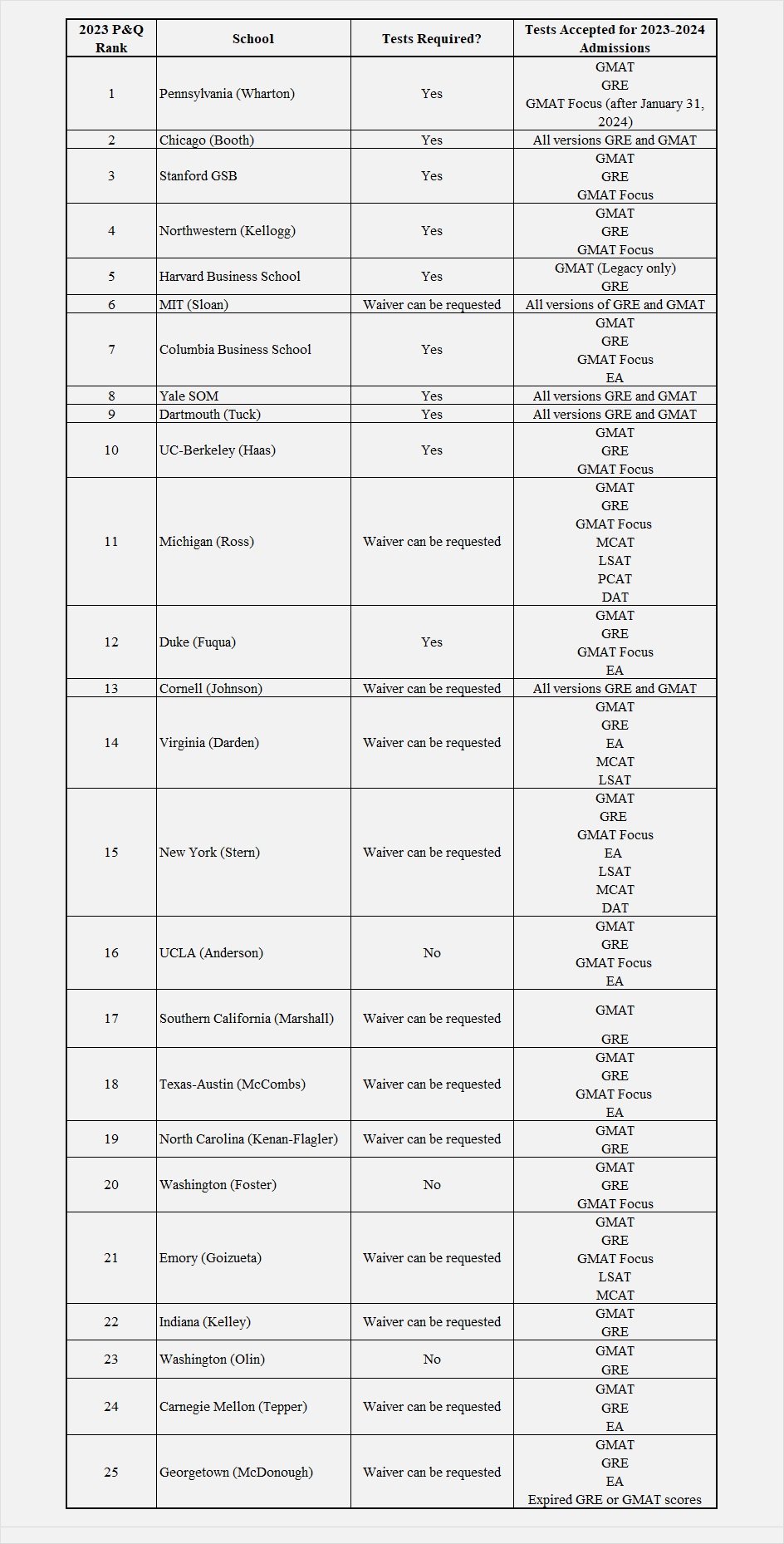A recent analysis by Poets & Quants found that many MBA programs will bring back standardized testing requirements for this year’s admissions cycle. Among the U.S. News Top 25 ranked schools, 18 are requiring applicants to submit test scores, two are not, and just five will offer test-waivers. In the last year, NYU Stern, Virginia Darden, Carnegie Mellon Tepper, Emory Goizueta, USC Marshall, and Indiana Kelley have reversed their test-waiver policies in lieu of a standardized testing requirement.
USN Rank & School Name % GMAT 2023 % GRE 2023 Tests Required?
1 Stanford GSB 61% 39% Yes
1 Pennsylvania (Wharton) 67% 37% Yes
3 Chicago (Booth) 63% 32% Yes
3 Northwestern (Kellogg) 67% 29% Yes
5 MIT (Sloan) 54% 34% Waiver option
6 Harvard 69% 34% Yes
7 Yale SOM 62% 37% Yes
7 New York (Stern) 45% 22% Yes
7 UC-Berkeley (Haas) 46% 53% Yes
10 Dartmouth (Tuck) 61% 42% Yes
10 Virginia (Darden) 35% 34% Yes
12 Columbia 53% 26% Yes
12 Duke (Fuqua) 34% 37% Yes
12 Michigan (Ross) 38% 36% Waiver option
15 Cornell (Johnson) 42% 16% Waiver option
16 Carnegie Mellon (Tepper) 40% 24% Yes
16 Texas-Austin (McCombs) 34% 30% Waiver option
18 USC (Marshall) 36% 33% Yes
18 Emory (Goizueta) 28% 24% Yes
20 UCLA (Anderson) 65% 32% No
20 UNC (Kenan-Flagler) 28% 23% Yes
20 Vanderbilt (Owen) 36% 23% Waiver option
20 Indiana (Kelley) 42% 13% Yes
24 Georgetown (McDonough) 34% 37% Yes
25 Georgia Tech (Scheller) 30% 30% No
Data compiled by P&Q from U.S. News & World Report 2024 MBA Rankings dataset
In addition to many schools bringing back testing requirements, it is important to note that the GRE continues to gain momentum. Below, we show the schools within the Top 25 with the highest proportions of GRE and GMAT submissions. Find the full P&Q analysis, including a view of the GRE’s seven-year trend by school here.
Schools with the Highest Proportion of GRE Submissions (Top 25 USN Ranking)
USN Rank & School Name % GRE 2023 % GRE 2022
7 UC-Berkeley (Haas) 53% 45%
10 Dartmouth (Tuck) 42% 38%
1 Stanford GSB 39% 33%
7 Yale SOM 37% 39%
12 Duke (Fuqua) 37% 36%
24 Georgetown (McDonough) 37% 49%
1 Pennsylvania (Wharton) 37% 30%
12 Michigan (Ross) 36% 30%
Schools with the Highest Proportion of GMAT Submissions (Top 25 USN Ranking)
USN Rank & School Name % GMAT 2023 % GMAT 2022
6 Harvard Business School 69% 74%
3 Northwestern (Kellogg) 67% 76%
1 Pennsylvania (Wharton) 67% 71%
20 UCLA (Anderson) 65% 77%
3 Chicago (Booth) 63% 73%
7 Yale SOM 62% 58%
1 Stanford GSB 61% 67%
10 Dartmouth (Tuck) 61% 68%
Data compiled by P&Q from U.S. News & World Report 2024 MBA Rankings dataset



